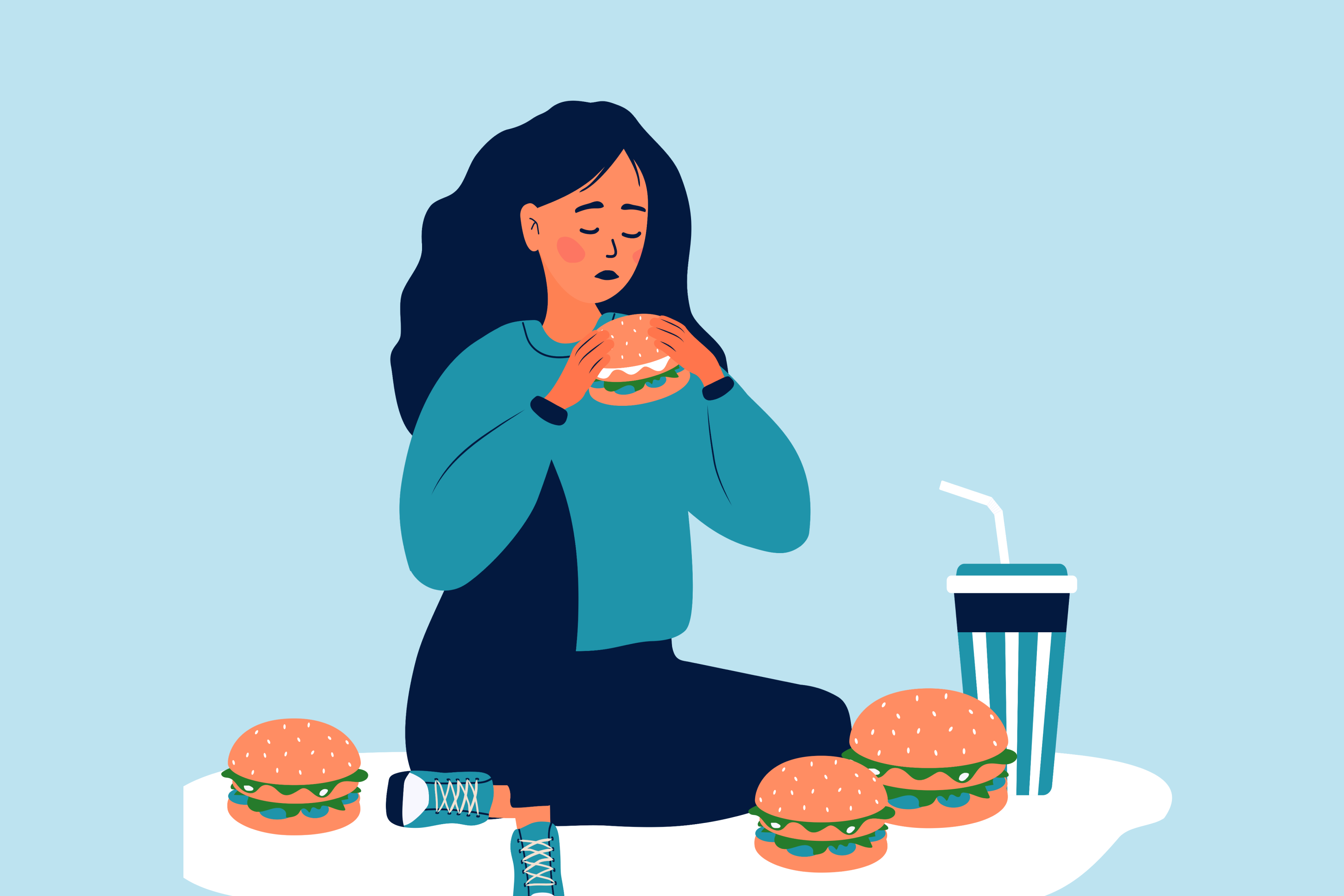The Distinction between Binge Eating and Overeating

Engaging in binge eating entails the rapid consumption of substantial amounts of food, even when not experiencing hunger, reaching a point of discomfort. While occasional overeating is commonplace, it can evolve into a disorder.
Binge Eating Disorder (BED) represents a severe yet manageable condition marked by repeated episodes of consuming excessive food. The inclusion of BED in the Diagnostic and Statistical Manual of Mental Disorders (DSM-5) occurred formally in 2013. In addition to the act of consuming large quantities of food to the point of discomfort, this disorder is characterized by a pervasive sense of being out of control during eating episodes, accompanied by feelings of shame or guilt.
Episodes categorized as binge eating, involving overeating to a discomforting extent, have the potential to significantly and adversely affect one's health and overall well-being. Identifying the indications and manifestations of binge eating is essential, underscoring the significance of seeking help when needed to manage and mitigate the possible adverse effects on one's health and overall well-being.
Symptoms of Binge Eating
The main signs of binge eating encompass two fundamental symptoms
- Consuming an abnormally large quantity of food within a brief time-frame.
- Experiencing a sense of being unable to control this eating behavior.
Furthermore, instances of binge eating become apparent when individuals exhibit three or more of the subsequent symptoms:
- Feeling uncomfortably full
- Eating at a faster pace than usual
- Consuming food when not hungry
- Experiencing feelings of disgust, guilt, or sadness
- Eating alone due to embarrassment
Binge Eating Diagnosis
Determining whether occasional overeating is a typical indulgence or a substantial issue of binge eating necessitates assessment from healthcare experts. While isolated instances of binge eating might be viewed as normal, persistent habits impacting one's life significantly warrant concern.
For a diagnosis of Binge Eating Disorder (BED), individuals must not only undergo marked distress but also refrain from compensatory behaviors like purging. Additionally, experiencing at least one weekly binge eating episode for three consecutive months is a diagnostic criterion.
To determine a diagnosis, your physician will ask about both your current and historical eating habits. The severity of binge eating varies; some may exhibit milder symptoms, engaging in binge eating approximately once a week, while others may grapple with more severe manifestations, binging 14 or more times weekly.
Complications Associated with Binge Eating
Binge eating can lead to various health complications, contributing to conditions such as anxiety, depression, diabetes, heart disease, high blood pressure, and stroke. These health issues are often closely linked to obesity, with approximately half of individuals diagnosed with binge eating disorder also grappling with overweight conditions.
Causes and Risk Factors of Binge Eating
The precise origins of binge eating remain elusive, but several potential risk factors have been identified:
- Genetics: Studies indicate a substantial genetic component in binge eating disorder, suggesting a hereditary influence on its development.
- Family History: Individuals with a familial history of eating disorders are more prone to developing binge eating disorder, underscoring the role of genetic predisposition.
- Emotional Triggers: Emotional elements, such as stress, trauma, or lingering emotional concerns, can serve as stimuli for episodes of binge eating.
- Societal Influences: Societal pressures, unrealistic beauty standards, and societal expectations regarding body image can contribute to the development of binge eating behaviors.
- Other Psychological Conditions: A significant correlation exists between binge eating disorder and other mental health conditions, such as depression, anxiety, or substance use disorders. This interconnectedness emphasizes the complex nature of these disorders.
- Dieting and Body Image Issues: Research indicates that individuals susceptible to binge eating disorders often harbor negative body image perceptions and possess a history of engaging in diets and overeating. This suggests a connection between distorted body image and the development of binge eating behaviors.
Varieties of Binge Eating
Distinguishing Over-eating and Binge Eating
Excessive eating encompasses a spectrum of behaviors, making it crucial to differentiate between mere overeating and binge eating.
Over-eating: Overindulging is a common experience for everyone, whether it involves enjoying extra slices of pizza, going back for seconds of a preferred meal, or consuming too much popcorn during a late-night movie.Contrary to binge eating, there are no rigid standards delineating what constitutes "typical" overindulgence. Individuals may gauge their behavior by considering if the amount of food consumed transcends what most people would eat in similar circumstances and time, as well as reflecting on their emotional state after overeating. Emotions following overeating can range from intense pleasure to disgust.
For instance, grabbing seconds during a holiday meal exemplifies overeating, contrasting with binge eating, characterized by consuming a substantial amount of food rapidly and feeling a loss of control.
Generally, those with binge eating tendencies exhibit more frequent episodes than occasional over-eaters. It's essential to note that continuous snacking throughout the day, known as grazing, doesn't fall under the category of binge eating.
Binge Eating: Binge eating differs from typical overeating in several aspects:
- Food is consumed more rapidly.
- Control over the quantity of food consumed is relinquished.
- Feelings of disgust, regret, or guilt follow the episode.
- Eating may occur in solitude due to embarrassment over the excessive food intake.
People experiencing binge eating disorder frequently describe an intense lack of control during episodes, often feeling compelled to consume food as if propelled by an irresistible compulsion. Some resort to hiding food in unconventional places or even pilfering it from others. Eating alone may stem from a sense of shame or embarrassment associated with the quantity of food consumed.
Treatment Options for Binge Eating
Tackling Concerns Related to Binge Eating: Effective therapy alternatives are available to help you manage and reduce substantial suffering if your eating habits are unhealthy. These options include psychotherapy, medications, or a combination of both, which employ various strategies for successful management.
Psychotherapy: Psychotherapeutic interventions, such as Cognitive Behavioral Therapy (CBT) and Interpersonal Therapy (IPT), have demonstrated efficacy in treating binge eating disorder. CBT specifically targets the identification and modification of negative thought patterns that contribute to undesirable behaviors. Getting expert assistance in the community or consulting your physician is essential to taking the initiative to stop binge eating. Qualified counselors, including licensed clinical social workers or psychologists, play a crucial role in guiding individuals through this therapeutic process.
Options for Medication: Using medication in addition to psychotherapy is one way to manage binge eating disorder. Prescribed medications may include antidepressants, anti-anxiety drugs, and medications designed to control appetite and compulsions.
Vyvanse (Lisdexamfetamine): Vyvanse, has emerged as a medication option for treating binge-eating disorder. Approved by the Food and Drug Administration (FDA) in 2015, lisdexamfetamine is prescribed to adults experiencing binge eating episodes. This medication aids in addressing the underlying neurological factors associated with binge eating, providing an additional avenue for comprehensive treatment.
Additional Treatment Options: In conjunction with psychotherapy and medications, there are other therapeutic approaches and lifestyle modifications that individuals may consider to enhance their overall treatment experience:
- Nutritional Counseling: Consulting with a registered dietitian or nutritionist can provide valuable insights into developing healthier eating habits and understanding nutritional needs.
- Support Groups: Engaging in support groups, either in-person or online, creates a sense of community and shared experiences. Interacting with others who are undergoing similar challenges can offer emotional support and practical coping strategies.
- Mindfulness and Stress Reduction Techniques: Incorporating mindfulness practices and stress reduction techniques, such as yoga or meditation, can contribute to better emotional regulation and awareness of triggers for binge eating.
- Regular Physical Activity: Establishing a consistent exercise routine not only promotes physical health but also positively impacts mental well-being. Engaging in physical activity serves as a positive means of handling stress and diminishing the probability of experiencing binge eating episodes.
Strategies for Managing Binge Eating
In addition to seeking professional assistance and external support, various proactive measures that can aid in controlling and preventing episodes of binge eating. These strategies encompass:
- Conscious Acknowledgement of Hunger: Develop an awareness of your hunger cues to avoid reaching a state of extreme hunger, which can contribute to binge eating. Prioritize consuming healthy meals or snacks to address hunger before it intensifies.
- Identification and Removal of Trigger Foods: Recognize and remove from your home environment those foods that are likely to induce episodes of binge eating. Removing these items can diminish the temptation and reduce the likelihood of succumbing to binge eating.
- Focused Mealtime: Avoid distractions while eating by turning off electronic devices and refraining from engaging in activities like watching TV or reading. Keeping mealtime as a distinct and focused activity can enhance awareness of portion sizes and foster a healthier relationship with food.
- Maintaining a Food Journal: Keeping a comprehensive record of your food intake enables you to identify patterns and potential triggers for overeating or binge eating. Additionally, note your emotional state during meals, as emotions often play a significant role in these behaviors.
- Engaging in Productive Activities: Combat boredom, a potential trigger for overeating, by actively seeking out productive and enjoyable activities. Cultivating hobbies or pursuing interests can provide a fulfilling alternative to turning to food during idle moments.
- Establishing Regular Meal Times: Create a consistent schedule for meals and snacks to regulate eating patterns. Regular meal times contribute to a structured routine, reducing the likelihood of impulsive and excessive eating.
- Incorporating Balanced Nutrition: Focus on maintaining a balanced and nutritious diet to ensure that your body receives essential nutrients. A well-balanced diet supports overall health and may contribute to reducing cravings for unhealthy, binge-triggering foods.
- Hydration and Self-Care: Stay hydrated throughout the day as dehydration can sometimes be mistaken for hunger. Additionally, prioritize self-care activities such as adequate sleep, stress management, and regular physical exercise to promote overall well-being.
Implementing a combination of these strategies, customized to individual preferences and circumstances, can contribute to a comprehensive and effective approach to managing and preventing binge eating episodes.




